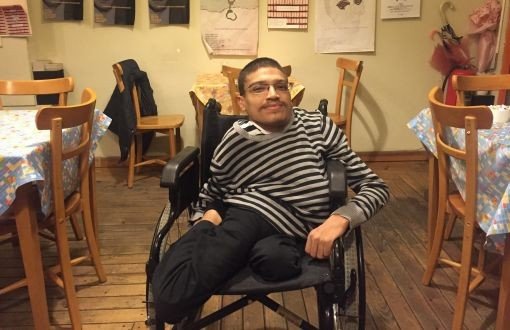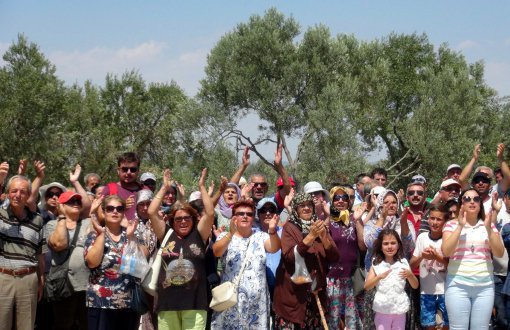October 22, 2014 – İBB (İstanbul Metropolitan Municipality) passed the buck on Şişli Municipality
October 29, 2014 – Poles are fixed
November 8, 2014 – Poles are broken
February 19, 2015 – Police officers found an opportunity to park on pavement
March 16, 2015 – I trolled Hayri İnönü’s Twitter to have the poles fixed again. Action received.
March 23, 2015 – A construction worker pulling out the pole was caught
March 28, 2015 – The poles were replaced with concrete pyramid king posts
September 7, 2015 – Truck came out, we fought, a stronger barrier was placed
October 14, 2015 – Someone again destroyed the latest barriers.
Notes above are from Simto Alev's notes.
Alev is a very dedicated Twitter user, and a very persistent person. He has been struggling for two years to have the broken roadblocks of a pavement in Şişli repaired. He is not giving up.
Interface designer Alev is a blog writer as of aged 16. He writes on music, theater, actual politics and disability issue in his blog, simtoalev.com.
We’ve spoken with Alev on his social media struggle.
How effective is social media usage in solving issues of disabled?
I’ve been using social media, namely Twitter and Facebook for the past 3-4 years. I mention municipality with photos on Twitter as a problem arises. These tweets receive sometimes 500 RT, which increases the pressure on municipality.
Since I live in Şişli, my issues are mostly related to this district. However, problems are the same in all municipalities. Social media users of Şişli Municipality are good in this area. They respond in a few minutes or hours, and they solve the issue in one week or 10 days. I mostly notify pavement issues. However, sometimes you can’t make any progress.
Social media users of İstanbul Metropolitan Municipality are very good as well. They respond to you right away, but they make a liar out of you or you can’t reach any conclusion.
Is there any example of it?
For instance, elevator of Şişhane metro was out of order for six months. We were going with my sibling every week to check it. Security usually helps, I go down by escalator. Sometimes he doesn’t want to help, we fight for that.
Anyhow, I wrote this issue on Twitter many times. They say “We will take care of it” but no progress so far. They fixed the malfunction at the end of six months and hanged this note on the wall, “the elevator has malfunctioned for three hours and we fixed it”. So they are making a liar out of me, but I have photos.
In fact, mindset is more important than social media in solution of the issues. Social media is more practical than phone but nothing changes as long as the mindset remains the same.
Is this process exhausting?
It’s not exhausting but tiring. However, I prefer to have a corner of a pavement replaced over just talking as some foundations do.
You have an article on “deidentification”. What does this concept mean for you?
Being disabled is just a physical condition to me. Yes, it might be hard sometimes but the reason of it is what we’ve just talked about.
I am living an ordinary life. I wake up in the morning, do my job, going to concert, read book, play music, write blog etc. It doesn’t matter whether I succeed in these practices. What matters is, I have these.
For instance, it is ridiculous to be referred as disabled blog writer, so is saying “Disabled but interface designer”. I am a blog writer. There are even some people who surprise by the music I listen to.
What do you think about media’s look at disabled people?
Media reflects society after all. As long as you don’t see disabled people in the streets, this is how disabled people will take place in media. Ultimately, an agitated disabled news receives rating.
For instance, a disabled expert is hosted on a TV program on disabled people, and people say “Look, he/she is disabled but has become a lawyer, an expert”.
What kind of reactions do you get in streets?
It has gotten less frequent in the recent years but sometimes they were asking whether I can’t walk. I was saying things like, “No I can walk but I sit because it’s more comfortable in this way”. People see a form that they haven’t seen before, that’s why they ask.
This will improve as there will be more disabled people in streets. People nowadays get less surprised but there are some who give the stink-eye. They think “If you are not like me, then I don’t accept it”. There was a survey once, the results indicated at least half of the doesn’t want disabled neighbor. There is hatred beneath that. (NV/TK)
Click here to read the article in Turkish










